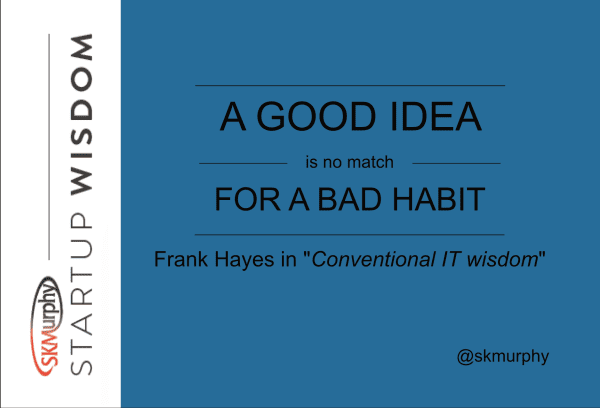Some great insights from a column by Frank Hayes on “Conventional IT Wisdom” including: “A good idea is no match for a bad habit.”
Data, Information, Knowledge
…and the Wisdom To Know The Difference
“Data isn’t information.
Information isn’t knowledge.
Knowledge isn’t manageable.”
Frank Hayes in “Conventional IT wisdom“
For me the first one concerns “tacit knowledge” (Michael Polyani‘s shorthand phrase for the fact that we can know more than we can tell, and not all know how is available to introspection), the knowledge that individuals or teams possess that can’t be separated from the person or group. As your startup grows your team is going to become individually and collectively more knowledgeable about the problems you are solving for your customers–at least, paraphrasing Edison, you will learn a lot of things that don’t work. It’s probably useful to focus as much on developing the people and teamwork by developing checklists and simple score keeping mechanisms as asking them to document everything.
Functional But Not Particularly Useful
“Functionality is not the same as usefulness.”
Frank Hayes in “Conventional IT wisdom“
There are many things that can be developed that won’t get adopted, some may be purchased that are not adopted but that’s not a sustainable business model. Much of the risk in our startups has to do with your prospects perception of the usefulness of what you’ve developed (do they want to become paying customers), this can get ignored in the very early days when the team is more obsessed about being able to get a new technology or application working. It’s a very good idea to develop the demo before you finish the product (even if its’ just a one page illustration or prop) so you can assess if there is interest, does someone believe it will be useful.
Poor Execution Will Defeat a Good Idea
“A good idea is no match for a bad habit.”
Frank Hayes in “Conventional IT wisdom“
Large companies have recipes for a business that work and many roles you can fill as part of a successful team. As long as you are good at something they can balance your weaknesses with others who have complementary strengths. Startup founders have to periodically evaluate what they may be doing or failing to do that is holding the business back. They have to get rid of every bad habit because their business cannot afford them, and the strength of their ideas cannot overcome poor execution.


Pingback: SKMurphy, Inc. » Quotes For Entrepreneurs–March 2012
Pingback: SKMurphy, Inc. Quotes For Entrepreneurs–April 2015